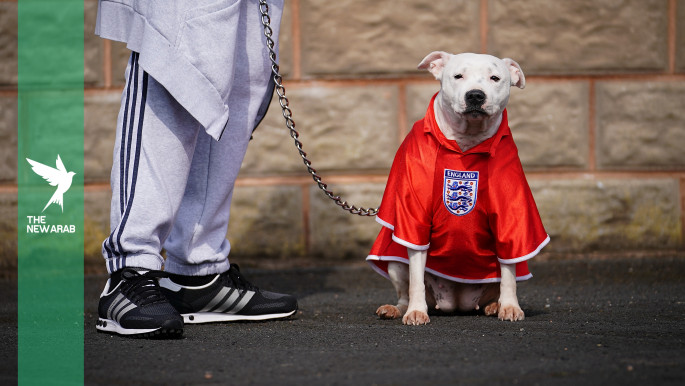For many in Britain, like their cousins in Ulster, the only way to reach the future is by way of the past, writes Adam Doyle [photo credit: Getty Images]
Union Jacks and Saint George’s Cross flags flutter from lamp posts in the heat of a waning English summer, motorway bridges festooned with banners, and zebra crossings marked with red crosses from Tower Hamlets to Durham.
Since mid-August, operation ‘Raise the Colours’ has seen a throng of activists raising flags across England and beyond as fast as local authorities remove them.
This movement, if it can be called that, has been endorsed by all the usual suspects, including Britain First’s Paul Golding and prominent Zionist activist Stephen Lennon (AKA Tommy Robinson), and currently, it shows no sign of slowing down.
What is particularly striking to me, as an Irishman, is seeing parts of the Midlands coming to resemble Lisburn or Bangor. These territorial markers (make no mistake that’s what they are) are common in Ireland’s occupied six counties; for decades, Protestant towns and streets have been lined with scores of Ulster Banners, Union Jacks, and paramilitary flags.
Markers of areas where reactionary ethnopolitics have taken precedence over functional institutions, and shady figures use fear of the other to keep their fiefdom under the boot. Seeing them spring up in England, I can’t help but wonder if they portend another of the Empire’s chickens coming home to roost, and with it the division, repression, and political paralysis once reserved for the colonies.
The British Far Right has long been infatuated with Ulster Loyalism, exalting it as an aspirational form of super-patriotism long extinct in Britain.
Loyalism’s ruthless violence and flag-waving pomp echo the idealised Postman Pat past that the British Right imagines it can resurrect.
Naturally, groups like the BNP, National Front, and Combat 18 forged close ties to organisations across the Loyalist ecosystem throughout the Troubles, with key players sometimes holding dual membership.
However, for the most part, direct involvement with militant Loyalism was something only the truly fanatical stumbled upon through right-wing literature obtained via mail order, prisoner welfare associations like the LPWA, or football hooliganism.
Today, organisational links are no longer necessary. Disseminating tactics and ideology, previously the sole preserve of dangerous bald men on either side of the Irish Sea, can now be done through TikTok or via the travelling band of right-wing content creators who routinely document the ongoing arrest. June’s riots in Ballymena, Co. Antrim, saw Loyalist youth burning homes, cars, and public buildings in response to the sexual assault of a young girl by two Romanian nationals.
What started as a violent protest quickly escalated into a full-blown pogrom, seeing immigrants in the town scramble to drape their homes in Loyalist symbols in the hope the mob would pass peacefully by their door. Numerous livestreams on TikTok and Instagram showed the violence live.
Anglos cheered the violence on in comment sections as houses in Ireland were petrol bombed and pelted with bricks. And it worked — Ballymena has seen over 60% of its 1200 Roma residents leave, and you can bet the British far right are taking notes and praying for a breakdown in public order.
Such a breakdown, particularly civil war, has been the subject of dozens of right-wing podcasts and YouTube videos for the past six months, regularly featuring Professor David Betz, a King’s College London War Studies expert.
While Betz’s and others’ personal hard-ons for civil war are likely alarmist and darkly hopeful, unrest and violence are almost guaranteed to worsen.
As they do, wounds will be gouged in the sinew of Britain that will tear open again and again, things will break that will take decades to mend, and people will die. The only way out is to be honest and look for solutions.
The first thing to admit is that Westminster’s long-botched handling of irregular immigration has turned disasterously ugly. Asylum hotels are generally placed in disadvantaged areas with little thought for the well-being of local residents or the migrants, whilst the private companies that operate the hotels receive around £2.1bn of public money annually.
This creates the now weekly fixture of a baying mob tailed by a gaggle of Hope Not Hate activists — often parachuted in from more cosmopolitan areas for a tone deaf appeal to the community to be nice in the wake of disturbing crimes by migrants against locals, as was the case in Epping, Nuneaton, and Sutton in Ashfield.
This mass panic around asylum hotels, which many decent people now perceive as a threat to their children — a perception not helped by the 200 asylum hotel residents charged with crimes this year — is not going away. This is further compounded by perceived lax sentences for serious offenders and the tsunami of online misinformation.
This fear is then carefully manipulated into anger against Britain’s 3.9 million Muslims by Britain’s Zionist-infiltrated right-wing commentariat. Who gleefully bundle British Muslims, Palestine, and irregular immigration into a single three-headed hydra to be lanced by flag-draped patriots.
Additionally, British law enforcement’s failure to combat grooming gangs, as well as allegations of ‘two-tier policing’ during last year’s Southport riots, have created the impression among the white working class that they are under attack, or worse, being replaced. Their British identity is intrinsically tied to a state that no longer cares about them. For a demographic that has been systemically disenfranchised and demonised for decades, any further loss of status in their homeland is too much to take.
Subscribe Now and Listen to our Podcasts On
In response, many of Britain’s ‘socialists’ only seem capable of offering sneering clichés about eating Indian curries and driving German cars, statements which ironically underscore the UK’s transition to a service economy that many are not adequately educated or empowered to participate in.
The incessant cries of ‘Nazi’ and ‘racist’ have rendered those words meaningless, now just unhelpfully washing over people who are too angry, scared, or radicalised to care.
Following victories in Ballymena, Epping, and Canary Wharf, the flag-shagging Jihad is unlikely to lose momentum. Groups like Britain First and Reform UK will only continue to grow as people abandon traditional politics in favour of anyone who promises an end to irregular immigration.
The more England’s fractured society comes to resemble the North, the more its policing will as well. The tactics perfected in the North in the 1970s were later deployed against striking miners in the 1980s. Westminster will tramp militarised policing in from its closest colony like shit on its shoe.
Unleashing surveillance technology tested in its Ulster laboratory (often alongside states like Israel) on their own people. This slide toward authoritarianism can already be seen in the hundreds arrested for protesting genocide or the 13-month imprisonment of a child-minder for venting her rage online after the murder of three children.
The cross-pollination of decades of British frustration over immigration and Loyalism’s pathological siege mentality may bear poisonous fruit. In a worst-case scenario, the delineation of Saxon territory, if it intensifies, will incite Britain’s Muslims and others to follow suit —a true Island of Strangers.
On this new island, Whitehall can act as the colonial administration it was born to be, managing the decline and the inevitable tribal and sectarian unrest from its satrapy on the Thames — the once proud towns of England reduced to ‘flegs’, Greggs, and Turkish barbers, heavy with tension and self-partitioned like a thousand tiny colonies.
For many in Britain, like their cousins in Ulster, the only way to reach the future is by way of the past. People are tired. Years of austerity, skyrocketing house prices, stagnant wages, and record immigration have left millions with nothing to call their own but their flag.
Adam Doyle is an Irish artist and political commentator working under the moniker ‘Spicebag’. Doyle’s work around Irish culture, politics and Palestinian solidarity has garnered international coverage.
Follow him on Instagram: @spicebag.exe
Have questions or comments? Email us at: editorial-english@newarab.com
Opinions expressed in this article remain those of the author and do not necessarily represent those of The New Arab, its editorial board or staff.


